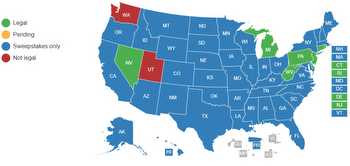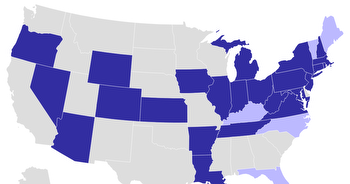New Jersey Online Gambling Sector Takes the Lead
New Jersey’s online gambling sector is undergoing an incredible shift with gambling and sports betting driving significant growth within the industry. While traditional land-based casino revenue has yet to fully recover to pre-pandemic levels, the online and sports betting sectors have been setting new records, transforming the state’s gambling landscape.
In 2013, New Jersey made the first move by legalizing online gambling, positioning the Garden State ahead of several states in terms of competitiveness. The New Jersey Division of Gaming and Enforcement reported the state’s impressive gambling revenue numbers earlier this year, outperforming most other states that have legalized online gambling and sports betting thus far.
An Increase in Online Gambling Revenue
A report released in April 2024 shows that online gambling has witnessed a remarkable increase, positioning New Jersey as an increasingly dominant force in the gambling sector. Online casinos and poker rooms brought in a staggering $187.9 million in revenue, marking the second-highest monthly total ever recorded, This percentage reflects an 18.2% uptick compared to the previous year, highlighting the sector’s incredible growth.
Very few states where online gambling is legal are seeing such high numbers like New Jersey. For example, Pennsylvania’s online gambling market brought in around $100 million in revenue in 2022, while Michigan’s was around $60 million for the same year- both significantly lower than New Jersey’s number alone. Additionally, the total gambling revenue of $510 million in April 2024 for New Jersey, including traditional land-based and online casinos and sports betting platforms, ranks among the highest nationwide for a single state.
A few states like Colorado and Virginia have recently approved crypto deposits for online sports betting through partnering with crypto exchange platforms, but New Jersey has not taken that step yet. Since New Jersey’s online gambling is a significant source of tax revenue for the state, it could benefit from introducing cryptocurrencies to online gambling. The regulations and legal framework for crypto betting vary by jurisdiction, or in this case by state. Because many states are still working to put crypto gambling frameworks into place, many bettors opt to play at offshore international crypto casinos. These casinos are often licensed and registered in countries like Curacao, which has more lenient gambling laws (source: cryptocasinos.ltd). While for now, many players use offshore sites, accepting cryptocurrencies like Bitcoin could further increase the market size and generate even more taxes in states like New Jersey.
The rise of online gambling could have been spurred by the pandemic, which led to several in-person casinos closing and pushing more people to try online gambling platforms. Although in-person gambling has resumed, the convenience and accessibility of online gambling have continued to attract a growing customer base.
Sports Betting Revenue Continues to Grow
Sports betting has also experienced an incredible increase in revenue in New Jersey since its legalization in 2018. In April’s 2024 report, over $1 billion in sports bets were placed, which ranks as the highest monthly total since the industry’s inception. Although there was a dip from the previous year, it highlights the enduring appeal of sports betting within the state.
The legalization of sports betting has created new revenue streams for online casinos and racetracks, allowing them to meet the increased demand for betting on collegial sports events. Partnerships with major sports betting operators have also played a vital role in facilitating this growth, providing user-friendly platforms and a wide range of betting options for New Jerseyans.
The success of sports betting in the state has inspired several other states to follow suit by legalizing and regulating the gambling industry, driving its growth across the country. As more states embrace sports betting, the competition among operators is expected to increase, potentially leading to innovative offerings and better customer experiences.
Factors Driving New Jersey’s Online Gambling Success
Early Adoption and Regulation
Since New Jersey took the lead in 2013 by being one of the first states to legalize and approve online gambling, it has given Garden State a competitive edge and the lead over many other states in the country. This early initiative paved the way for its online gambling sector to develop and solidify its presence pretty early on. The state established a legal framework and regulations managed by the New Jersey Division of Gaming Enforcement, whose objective is to ensure player protection, and fairness, and foster confidence in authorized online gambling platforms. This oversight has played a massive role in attracting operators and players alike.
Accessibility and Convenience
One of the benefits behind the increase of sports betting and online gambling platforms is the ease of access and the round-the-clock availability it provides players, allowing them to place in the comfort of their own homes or on the go using mobile devices. This appeals to a wide demographic, including individuals who live far away from a physical casino.
Variety of Casino Games and Offerings
New Jersey’s online casinos offer players a wide range of casino gaming options like slots, table games, and live dealer games which cater to varied player interests and preferences. This variety, coupled with innovative new gaming formats, like liver dealers and gamification elements, keeps the online gambling experience fresh and engaging.
Strategic Partnerships and Marketing Strategies
Strategic partnerships between casinos and their online platform providers have enabled user-friendly platforms and seamless integration of online gambling experiences. Marketing strategies by operators, including bonuses, promotions, and loyalty programs, have been an effective tactic to retain and attract players in the competitive New Jersey market.
Tax Revenue and Economic Impact
The online gambling sector has generated substantial tax revenue for the state of New Jersey, over $7 billion since its inception. This economic impact has incentivized the state to continue supporting the growth of this lucrative sector. Through its regulatory approach focusing on convenience and diversity, strategic partnerships and promotional efforts, as well as substantial tax contributions, New Jersey has positioned itself as a trailblazer in the online gambling and sports betting sector.
Addressing the Challenges and Concerns
Despite the growth of online gambling and sports betting, there are challenges and concerns New Jersey has to address. One key issue is the scrutiny faced by the gambling sector regarding its regulations and the need for robust consumer protection measures to maintain public trust. It is essential for the industry to ensure data privacy, gaming standards, and responsible gaming advertising to prevent harm. There is also a concern about the impact online gambling has on brick-and-mortar casino revenues. While these two sectors are often seen as complementary, some believe that the ease of online gambling platforms could lead to a decline in in-person visits, especially in the younger demographic.




































